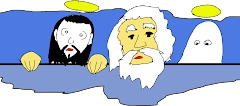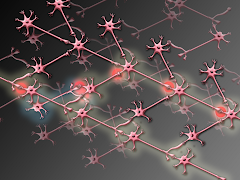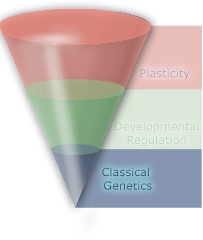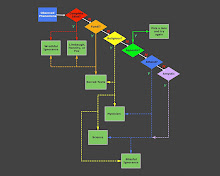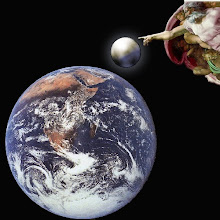Part one was a simple review of the structure and the function of the basic building block of the CNS: the neuron. This installment will attempt to cover a simple explanation of the very complex processes of Neuroplasticity and pruning. These are critical concepts in our understanding of the biological basis of cognition.

To review, each neuronal soma (body) has many input jacks (dendrites and receptors) and one output cable (axon) which can have more than one end connector. These individual neurons are arrayed in vast networks with many specialized functions (a subject we will return to in a later installment). These arrays are very flexible and adaptable depending upon the quality and quantity of inputs; what we call experiences. Below is a greatly simplified diagram illustrating a section of brain tissue with all the supporting bits removed. It’s important to realize that although this diagram looks pretty complex and meaty, in reality each of the neurons could have 5-15 thousand dendritic connections. In real brains the connectivity runs into the trillions.

The next diagram illustrates the beginning of neuronal impulse propagation. The neuron with the red arrow has been stimulated sufficiently by the axon end terminus to the left, for it to depolarize and propagate the impulse to other neurons down the line. Although the blue arrowed neuron also received a signal from the left neuron, in this case either the signal was inadequate to fire the blue arrowed neuron or other neurons were sending it suppressive signals to stand down. Although there may have been local alterations in the membrane potential of these dendrites, a full scale action potential was not triggered.

The fourth diagrams shows how the signal may be passed down a particular pathway to the exclusion of others.

Or it may take a more circuitous route or even multiple routes as in the diagram below.

How one or more tracks gets favored is the fun part. The availability and facility with which an impulse travels along various pathways within this network is the cornerstone of our minds. The tracks selected depend upon inputs and a variety of structural, electrochemical, and genetic processes. It’s very complicated. It is rocket science. But that
doesn’t mean a person can’t understand the basic premise. How these pathways come to be, is at the heart of our thinking, our core being, and our memories (both procedural and experiential). It’s what experts call
neuroplasticity.
There’s a lot of confusion about this term, but hopefully we can get rid of some of the mystery. At a high level,
neuroplasticity refers to the fact that structural and functional changes to the brain can be permanently created through the variety and intensity of experiences. Keep in mind that experiences are combinations of sensory inputs to the brain mitigated by the residual effects of similar experiences and the their behavioral impact. That definition is true but I think it’s confusing to all us non-
neuroscientists. It conjures up images of neurons replicating and filling our heads with more cells or creating new brain regions in response to new experiences. That’s not really it. Plasticity has more to do with biochemistry and 'functional anatomy' than classic anatomy with one huge exception we’ll get to later.
We have these enormous neural networks waiting for something to do. We start out with vastly greater numbers of connections than we will likely ever need. The redundancy is in orders of magnitude. So
neuroplasticity is not so much building new structures as much as it’s making certain existing ones much more efficient (and preferred) and eliminating ones we don’t ever use (a process aptly named ‘pruning’). Starting with a situation where two competing paths are possible (obviously there are many other possible permutations), how do we arrive at a situation where one is favored? It’s actually very simple to explain as long as we keep way from the complex molecular biology and biochemistry of the process (which is unbelievably cool if you are into that sort of thing).
At its most basic the process is this:
- Strong or repetitive stimulation of a dendritic connection by impulses from an associated axon.
- Responsive activation of genes linked to the dendritic membrane receptors within the nucleus resulting in transcription and mRNA formation.
- Translation of the mRNA and production of either increased numbers of receptors or receptors with more efficient neurotransmitter binding.
- Selective transport of the enhanced receptors to the specific dendrite (or dendrites) that triggered the response, resulting in greater sensitivity of those dendrites to future stimuli. (for Jared, I was careful to avoid the dreaded ‘code’ word)
In essence, the connections to these axons are
plastically enhanced. This mechanism appears to be extremely important to how the brain actually functions outside of philosophy discussions. Although the basic structure of the neural net is the same as before, functionally, a new executable has been structurally created (biochemically) that changes the behavior of the system to subsequent stimuli. Future stimuli can trigger this enhanced pathway more easily and the target neuron may not require as many supporting stimuli from other axons as it originally required. We’ll return to this topic when we look at the effects of hallucinogens in a future installment (it also explains why some of those drug induced states may become permanent). We’ll also noodle a bit on how this arrangement may explain a host of observable phenomena from mnemonics to confirmation bias (that’s a teaser!).
So as the next two diagrams show, strong, multichannel, or repetitive stimulation of a pathway results in the creation of changes to the structure of the connections between neurons. The interplay of major pathways, regulatory paths (the neuron with the blue aura), and multiple convergent channels can strengthen these enhanced pathways. Future stimuli or previously inadequate stimuli from primary or secondary pathways may be sufficient to trigger the path. Since the pathways don't exist in a
vacuum, previously unrelated stimuli (coming in from any of the thousands of alternate attachments) may be sufficient, post enhancement, to trigger an action potential - think about what memory process that helps explain.


This explains the plastic changes that result in new functional structures at a high level. It also helps explain why the old computer / software saw falls apart a bit. Memory and cognitive processes are more akin to self etching chips than to a traditional digital computer with fixed hardware and add on software. The flip side to this is what happens to connections that
aren’t doing anything. This next process helps explain why kids may have twice as many connections per neuron as adults. Take the circled axon dendrite connection circled below.

If this connection never amounts to much (few stimuli, or greatly overshadowed by others) it may be ‘pruned’ as in the second picture. This latent connection is lost resulting in another permanent change to the structure of the brain. "Use it or lose it" is something the brain has known about for a long time.

Talk about pruning! This little exercise prunes about 98% of the science away, but hopefully this helps to better understand three vital aspects of the brain: the extensive networks of neurons, how new functions and experiences result in permanent changes, and how lack of activity can result in loss of connectivity. FYI: If you understand the pun in the title, you get a gold star for today...





















